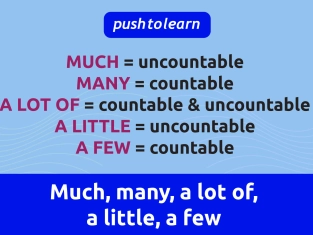by PushtoLearn
Quantifiers
Table of Contents
Quantifiers Exercises
These exercises focus on Quantifiers
Quantifiers with Countable and Uncountable Nouns
Some quantifiers can be used with both count and uncount nouns:
|
Quantifier |
Example with a Count Noun |
Example with an Uncount Noun |
|
all |
All students passed the test. |
All the water is dirty. |
|
some |
I have some apples. |
There is some rice left. |
|
more |
Can you bring more chairs? |
We need more sugar. |
|
a lot of |
She has a lot of books. |
He drank a lot of milk. |
|
enough |
Do we have enough plates? |
There isn’t enough time. |
|
no |
There are no eggs in the fridge. |
There is no information available. |
|
any |
Did you see any people? |
Do you have any advice? |
|
most |
Most birds can fly. |
Most of the music was loud. |
|
lots of |
He has lots of friends. |
There is lots of food left. |
|
less |
(Not used with count nouns) |
Drink less coffee. |
Common Mistakes
❌ I have much apples. → (Incorrect, because "apples" is countable)
✅ I have many apples.
❌ There are less books. → (Incorrect, because "books" are countable)
✅ There are fewer books.

Quantifiers Only for Countable Nouns
Some quantifiers can only be used with countable nouns:
|
Quantifier |
Example |
|
(not) many |
I don’t have many pencils. |
|
each |
Each student got a book. |
|
either |
You can take either chair. |
|
(a) few |
I have a few ideas. |
|
several |
She has several pets. |
|
both |
Both phones are broken. |
|
neither |
Neither answer is correct. |
|
fewer |
Fewer cars are on the road today. |
|
a couple of |
I’ll be there in a couple of minutes. |
|
hundreds of |
There were hundreds of people at the event. |
|
thousands of |
Thousands of fans came to the concert. |
Common Mistakes
❌ I have much friends. → (Incorrect, "friends" is countable)
✅ I have many friends.
❌ She has fewer money. → (Incorrect, "money" is uncountable)
✅ She has less money.
Quantifiers Only for Uncountable Nouns
Some quantifiers are only used with uncountable nouns:
|
Quantifier |
Example |
|
(not) much |
There isn’t much sugar left. |
|
a bit of |
Could you add a bit of salt? |
|
a little |
I have a little time to help. |
|
a great deal of |
She has a great deal of patience. |
|
a good deal of |
He spent a good deal of money. |
Common Mistakes
❌ There isn’t many water. → (Incorrect, "water" is uncountable)
✅ There isn’t much water.
❌ Can I have few rice? → (Incorrect, "rice" is uncountable)
✅ Can I have a little rice?
Quantifiers for Groups and Specific Groups
We can use a noun directly after a quantifier when talking about general groups:
-
Few snakes are dangerous.
-
Most children love ice cream.
-
I never have enough time.
But when talking about a specific group, we add "of the":
-
Few of the snakes in this zoo are dangerous.
-
Most of the students in my class passed the test.
-
He spent all (of) the money I gave him.
Note: With "all" and "both," "of" is optional:
✅ Both the chairs are broken. = ✅ Both of the chairs are broken.
Both, Either, and Neither
These quantifiers are used for two items only:
|
Expression |
Example |
|
both |
Both hotels were expensive. (Refers to two) |
|
either |
You can choose either dress. (One or the other) |
|
neither |
Neither of the answers was correct. (Not one and not the other) |
💡 Grammar tip:
-
"Both" takes a plural verb (Both hotels are nice.)
-
"Either" and "neither" take a singular verb (Neither answer is correct.)
Every and Each
Both "every" and "each" mean all when used with singular nouns:
-
Every shop was closed. (Means all shops)
-
Each student received a certificate. (Focuses on individuals)
We also use "every" to talk about time:
-
We go on vacation every summer.
-
I take a walk every morning.
Common mistake:
❌ The every student got a gift. → (Incorrect, no article "the")
✅ Every student got a gift.
FAQs about Quantifiers
What is the difference between "few" and "a few"?
-
Few means almost none: Few people came to the party. (Hardly anyone)
-
A few means some, but not many: A few people came to the party. (Some did)
When do we use "some" and "any"?
-
Use "some" in positive sentences: I have some cookies.
-
Use "any" in questions and negative sentences:
-
Do you have any cookies?
-
I don’t have any cookies.
Is "less" used with countable nouns?
No, "less" is for uncountable nouns (less water), and "fewer" is for countable nouns (fewer bottles).
What is the difference between "each" and "every"?
-
"Each" focuses on individuals: Each child got a toy.
-
"Every" refers to the group as a whole: Every child got a toy.
Can "both" be used with more than two items?
No, "both" is only for two things. Use "all" for more than two:
-
Both cars are red. (Two cars)
